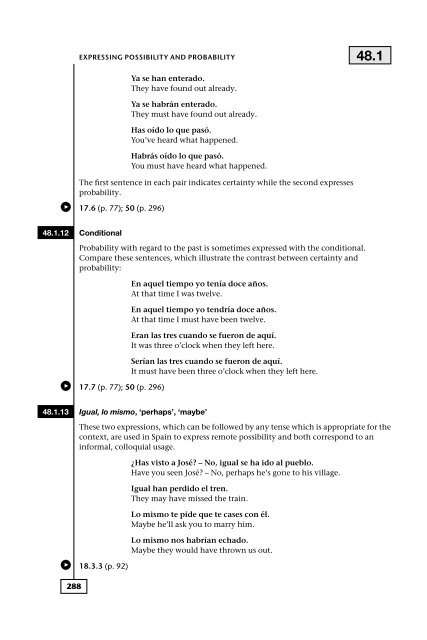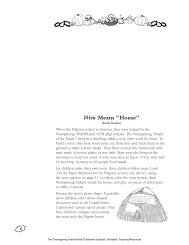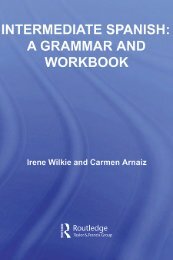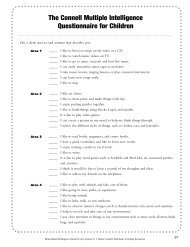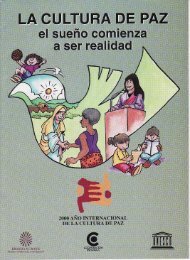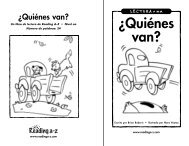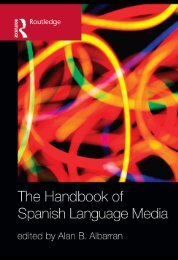- Page 2 and 3:
ModernSPANISHGrammarSecond Edition
- Page 4 and 5:
ModernSPANISHGrammarA practical gui
- Page 6 and 7:
ContentsIntroductionGlossaryxviixix
- Page 8 and 9:
Contentsvii12.5 ¿Dónde?/¿Adónde
- Page 10 and 11:
Contentsix24.2 Estar + past partici
- Page 12 and 13:
Contentsxi36.2 Enquiring about a su
- Page 14 and 15:
Contentsxiii49 Expressing certainty
- Page 16 and 17:
Contentsxv67.2 Suggesting a course
- Page 18 and 19:
Note to the Second EditionThe bi-pa
- Page 20 and 21:
GlossarySmall capitals indicate tha
- Page 22 and 23:
GlossaryxxiIré mañana o pasado.I
- Page 24 and 25:
GlossaryxxiiiNo te había visto.I h
- Page 26:
GlossaryTenseTenses are different f
- Page 30 and 31:
1Pronunciation and spellingPronunci
- Page 32 and 33:
The Spanish alphabet 1.1after other
- Page 34 and 35:
The written stress accent 1.5tra-er
- Page 36 and 37:
Punctuation 1.6como,cuando, etc.est
- Page 38 and 39:
2Gender and genderagreements2.1Masc
- Page 40 and 41:
Agreement classes of adjectives 2.6
- Page 42 and 43:
Lo2.8El niño no había comido en c
- Page 44 and 45:
Number agreement 3.2Some Latin loan
- Page 46 and 47:
4The articles4.1Definite articleThe
- Page 48 and 49:
Definite article + que and de4.3but
- Page 50 and 51:
Use of the plural unos, unas4.6 but
- Page 52 and 53:
Adjective position 5.2(c) Santo is
- Page 54 and 55:
Adjectives used as nouns 5.4Followi
- Page 56 and 57:
For the syntax of comparative const
- Page 58 and 59:
Ordinal numbers 7.2noventa 90cien,
- Page 60 and 61:
Expressions involving numbers 7.37.
- Page 62 and 63:
Subject pronouns 8.1SingularPlural2
- Page 64 and 65:
Object pronouns 8.2NOTETi does not
- Page 66 and 67:
Reduplicated pronoun structures 8.3
- Page 68 and 69:
Usage 9.39.39.3.19.3.2UsageEste cor
- Page 70 and 71:
Usage10.2Vuestro, etc., are often u
- Page 72 and 73:
11Relative pronounsThere is a fair
- Page 74 and 75:
Cuyo (adj.)11.411.4Cuyo (adj.)Cuyo
- Page 76 and 77:
¿Cuál? and ¿Qué?/¡Qué!12.212.
- Page 78 and 79:
¿Verdad?, ¿no? 12.9No sé por qu
- Page 80 and 81:
Cualquiera13.5Alguien ha mentido.So
- Page 82 and 83:
14Adverbs14.1Formation of adverbs i
- Page 84 and 85:
15Negation 32 (p. 191)15.1NoNo is t
- Page 86 and 87:
16Verb formsSection 16.1 gives an o
- Page 88 and 89:
The overall pattern 16.116.1.1.3The
- Page 90 and 91:
The overall pattern 16.1hemoshabéi
- Page 92 and 93:
The overall pattern 16.1cerramoscer
- Page 94 and 95:
The overall pattern 16.1Some verbs
- Page 96 and 97:
The overall pattern 16.1Poner ‘to
- Page 98 and 99:
The overall pattern 16.1(f) Past (i
- Page 100 and 101:
Perfect17.217.1.2 Reference to futu
- Page 102 and 103:
Preterite17.4(b) Saying politeness.
- Page 104 and 105:
Conditional 17.7(c) Saying promises
- Page 106 and 107:
Infinitive 17.11El que fuera niño
- Page 108 and 109:
Imperative17.13Subiendo por esta ca
- Page 110 and 111:
18Use of the subjunctiveSometimes t
- Page 112 and 113:
The subjunctive in complements of v
- Page 114 and 115:
The subjunctive after conjunctions
- Page 116 and 117:
The subjunctive after conjunctions
- Page 118 and 119:
The subjunctive in main clauses 18.
- Page 120 and 121:
19Sequence of tenseSpanish verb for
- Page 122 and 123:
Constructions involving the subjunc
- Page 124 and 125:
Llevar + gerund 20.3(c) Expressing
- Page 126 and 127:
21Modal auxiliary verbs andexpressi
- Page 128 and 129:
Querer 21.4(b) ObligationDebían (d
- Page 130 and 131:
22Ser and estar22.1SerSer is used:(
- Page 132 and 133:
Estar22.222.2EstarEstar is used:(a)
- Page 134 and 135:
Estar22.2Many adjectives can be use
- Page 136 and 137:
Reflexive verbs with prepositional
- Page 138 and 139:
The passive reflexive 23.923.8The i
- Page 140 and 141:
The passive reflexive 24.3Contrast:
- Page 142 and 143:
Bringing the object to the front of
- Page 144 and 145:
Basic use of prepositions 25.1Favou
- Page 146 and 147:
Basic use of prepositions 25.1al ai
- Page 148 and 149:
Basic use of prepositions 25.1(f) C
- Page 150 and 151:
Basic use of prepositions 25.1desde
- Page 152 and 153:
Basic use of prepositions 25.125.1.
- Page 154 and 155:
Basic use of prepositions 25.1Para
- Page 156 and 157:
Groups of prepositions 25.2sin deci
- Page 158 and 159:
26ComplementationBy complementation
- Page 160 and 161:
Infinitive complementation 26.2133d
- Page 162 and 163:
Infinitive complementation 26.2135e
- Page 164 and 165:
Infinitive complementation 26.2137b
- Page 166 and 167:
Infinitive complementation 26.2comp
- Page 168 and 169:
27ConjunctionsConjunctions are link
- Page 170 and 171:
Subordinating conjunctions 27.2Do n
- Page 172 and 173:
28Word order28.128.1.1StatementsThe
- Page 174:
Questions 28.2A topic may also be p
- Page 178:
ISocial contact andcommunication st
- Page 181 and 182:
MAKING SOCIAL CONTACTS 29.2¿Qué t
- Page 183 and 184:
MAKING SOCIAL CONTACTS 29.429.429.4
- Page 185 and 186:
MAKING SOCIAL CONTACTS 29.5Adiós.G
- Page 187 and 188:
MAKING SOCIAL CONTACTS 29.729.6.3Wi
- Page 189 and 190:
MAKING SOCIAL CONTACTS 29.8In Spain
- Page 191 and 192:
MAKING SOCIAL CONTACTS 29.829.8.7As
- Page 193 and 194:
MAKING SOCIAL CONTACTS 29.9 29.9.2.
- Page 195 and 196:
MAKING SOCIAL CONTACTS 29.9Tengo/te
- Page 197 and 198:
30Basic strategies forcommunication
- Page 199 and 200:
BASIC STRATEGIES FOR COMMUNICATION
- Page 201 and 202:
12.9 (p. 51)BASIC STRATEGIES FOR CO
- Page 203 and 204:
BASIC STRATEGIES FOR COMMUNICATION
- Page 205 and 206:
BASIC STRATEGIES FOR COMMUNICATION
- Page 207 and 208:
BASIC STRATEGIES FOR COMMUNICATION
- Page 210:
IIGiving and seeking factualinforma
- Page 213 and 214:
ASKING QUESTIONS AND RESPONDING 31.
- Page 215 and 216:
ASKING QUESTIONS AND RESPONDING 31.
- Page 217 and 218:
ASKING QUESTIONS AND RESPONDING 31.
- Page 219 and 220:
NEGATING 32.232.2Limiting the scope
- Page 221 and 222:
NEGATING 32.4Ni siquiera nos llamar
- Page 223 and 224:
33Reporting33.1Direct and indirect
- Page 225 and 226:
REPORTING 33.333.333.3.133.3.1.1 Re
- Page 227 and 228:
REPORTING 33.4Yo se lo había dicho
- Page 229 and 230:
REPORTING 33.6The use of a reportin
- Page 231 and 232:
34Asking and giving personalinforma
- Page 233 and 234:
ASKING AND GIVING PERSONAL INFORMAT
- Page 235 and 236:
ASKING AND GIVING PERSONAL INFORMAT
- Page 237 and 238:
35Identifying people, placesand thi
- Page 239 and 240:
36DescribingIn this chapter you wil
- Page 241 and 242:
DESCRIBING 36.2Él tenía mucho sen
- Page 243 and 244:
DESCRIBING 36.5El niño está grand
- Page 245 and 246:
DESCRIBING 36.9To describe the weat
- Page 247 and 248:
MAKING COMPARISONS 37.137.1.2 Más
- Page 249 and 250:
MAKING COMPARISONS 37.237.1.8Más/m
- Page 251 and 252:
MAKING COMPARISONS 37.3(f) Common e
- Page 253 and 254:
38Expressing existence andavailabil
- Page 255 and 256:
EXPRESSING EXISTENCE AND AVAILABILI
- Page 257 and 258:
39Expressing location anddistanceTh
- Page 259 and 260:
EXPRESSING LOCATION AND DISTANCE 39
- Page 261 and 262:
EXPRESSING LOCATION AND DISTANCE 39
- Page 263 and 264: EXPRESSING LOCATION AND DISTANCE 39
- Page 265 and 266: EXPRESSING POSSESSIVE RELATIONS 40.
- Page 267 and 268: EXPRESSING POSSESSIVE RELATIONS 40.
- Page 269 and 270: 41Expressing changesIn English, tra
- Page 271 and 272: EXPRESSING CHANGES 41.3El nuevo cam
- Page 273 and 274: EXPRESSING CHANGES 41.641.6Other wa
- Page 275 and 276: DESCRIBING PROCESSES AND RESULTS 42
- Page 277 and 278: DESCRIBING PROCESSES AND RESULTS 42
- Page 279 and 280: DESCRIBING PROCESSES AND RESULTS 42
- Page 281 and 282: EXPRESSING CAUSE, EFFECT AND PURPOS
- Page 283 and 284: EXPRESSING CAUSE, EFFECT AND PURPOS
- Page 285 and 286: EXPRESSING CAUSE, EFFECT AND PURPOS
- Page 287 and 288: EXPRESSING CAUSE, EFFECT AND PURPOS
- Page 290 and 291: 44Expressing knowledgeTo express kn
- Page 292 and 293: Learning or finding out about somet
- Page 294 and 295: Saying whether one remembers someth
- Page 296 and 297: Asking people whether they remember
- Page 298 and 299: Enquiring whether someone has forgo
- Page 300 and 301: Expressing obligation and duty with
- Page 302 and 303: Other ways of expressing obligation
- Page 304 and 305: Expressing needs with regard to one
- Page 306 and 307: Expressing needs in an impersonal w
- Page 308 and 309: Expressing strong need 47.447.3.5Se
- Page 310 and 311: Saying whether something is conside
- Page 312 and 313: Saying whether something is conside
- Page 316 and 317: Enquiring whether something is cons
- Page 318 and 319: 49Expressing certainty anduncertain
- Page 320 and 321: Saying how certain one is of someth
- Page 322 and 323: Enquiring about certainty or uncert
- Page 324 and 325: Common expressions of supposition 5
- Page 326 and 327: 51Expressing conditionsThis chapter
- Page 328 and 329: Unfulfilled conditions 51.251.1.5 S
- Page 330 and 331: Other conditional expressions 51.35
- Page 332 and 333: Other conditional expressions 51.3f
- Page 334 and 335: Common expressions of contrast or o
- Page 336 and 337: Common expressions of contrast or o
- Page 338 and 339: 53Expressing capability andincapabi
- Page 340 and 341: Enquiring and making statements abo
- Page 342 and 343: Seeking permission 54.154.1.3¿Se p
- Page 344 and 345: Giving permission 54.254.1.8 Rogar
- Page 346 and 347: 55Asking and giving opinionsThis ch
- Page 348 and 349: Expressing opinions 55.2Me gustarí
- Page 350 and 351: Expressing opinions 55.2Creo/creemo
- Page 352 and 353: Reporting on other people’s opini
- Page 354 and 355: 56Expressing agreement,disagreement
- Page 356 and 357: Asking about agreement and disagree
- Page 358: IVExpressing emotional attitudes
- Page 361 and 362: EXPRESSING DESIRES AND PREFERENCES
- Page 363 and 364: EXPRESSING DESIRES AND PREFERENCES
- Page 365 and 366:
EXPRESSING DESIRES AND PREFERENCES
- Page 367 and 368:
58Expressing likes and dislikesThis
- Page 369 and 370:
EXPRESSING LIKES AND DISLIKES 58.25
- Page 371 and 372:
EXPRESSING LIKES AND DISLIKES 58.3M
- Page 373 and 374:
59Expressing surpriseThis chapter c
- Page 375 and 376:
EXPRESSING SURPRISE 59.2Note that i
- Page 377 and 378:
EXPRESSING SATISFACTION AND DISSATI
- Page 379 and 380:
61Expressing approval anddisapprova
- Page 381 and 382:
EXPRESSING APPROVAL AND DISAPPROVAL
- Page 383 and 384:
EXPRESSING HOPE 62.2 62.2.2 62.3H
- Page 385 and 386:
63Expressing sympathyTo tell people
- Page 387 and 388:
EXPRESSING SYMPATHY 63.2Siento much
- Page 389 and 390:
64Apologizing and expressingforgive
- Page 391 and 392:
APOLOGIZING AND EXPRESSING FORGIVEN
- Page 393 and 394:
EXPRESSING FEAR OR WORRY 65.1No, en
- Page 395 and 396:
EXPRESSING FEAR OR WORRY 65.1Temía
- Page 397 and 398:
66Expressing gratitudeThis chapter
- Page 399 and 400:
EXPRESSING GRATITUDE 66.266.2Respon
- Page 402 and 403:
67Giving advice and makingsuggestio
- Page 404 and 405:
Giving advice and making suggestion
- Page 406 and 407:
Asking for advice and suggestions67
- Page 408 and 409:
68Making requestsIn this chapter yo
- Page 410 and 411:
Common expressions of request 68.1
- Page 412 and 413:
69Giving directions, instructionsan
- Page 414 and 415:
Giving instructions 69.269.2Giving
- Page 416 and 417:
Giving orders 69.369.3.3The future
- Page 418 and 419:
Making an offer or invitation70.1Va
- Page 420 and 421:
Making an offer or invitation70.170
- Page 422:
20.2 (p. 97); 17.5.2 (p. 76)Enquiri
- Page 426 and 427:
71Talking about the presentStatemen
- Page 428 and 429:
Talking about permanent and habitua
- Page 430 and 431:
Saying how long one has been doing
- Page 432 and 433:
Saying how long one has been doing
- Page 434 and 435:
Expressing possibility, probability
- Page 436 and 437:
Expressing plans and intentions 72.
- Page 438 and 439:
Referring to the immediate future 7
- Page 440 and 441:
Expressing possibility, probability
- Page 442 and 443:
73Talking about the pastThis chapte
- Page 444 and 445:
Referring to the immediate past 73.
- Page 446 and 447:
Talking about long-lasting past eve
- Page 448 and 449:
Talking about past habitual actions
- Page 450 and 451:
Expressing possibility, probability
- Page 452 and 453:
Expressing possibility, probability
- Page 454 and 455:
AppendixATENDER ‘to attend to’
- Page 456 and 457:
AppendixGUIAR ‘to guide’ guío
- Page 458 and 459:
AppendixSALIR ‘to go out’ salgo
- Page 460 and 461:
Index of words and topicsNOTEThe re
- Page 462 and 463:
Index of words and topicscientos 7.
- Page 464 and 465:
Index of words and topicsdistance 3
- Page 466 and 467:
Index of words and topicshelar 16.1
- Page 468 and 469:
Index of words and topicsmostrar Ap
- Page 470 and 471:
Index of words and topicsposiblemen
- Page 472 and 473:
Index of words and topicssentir 16.


